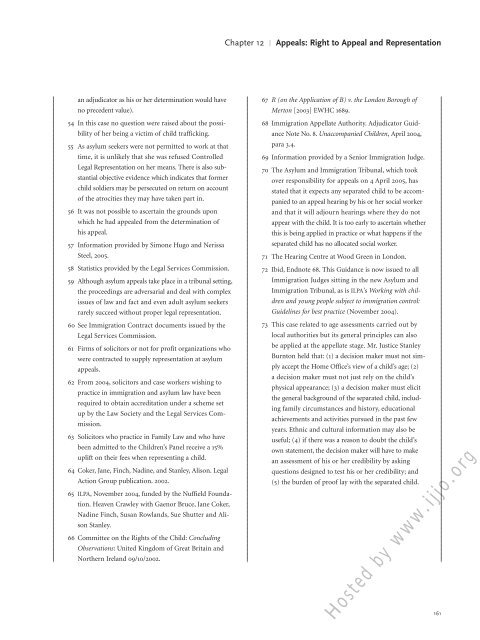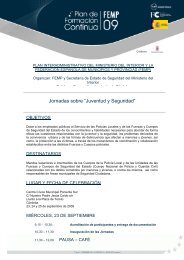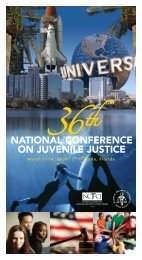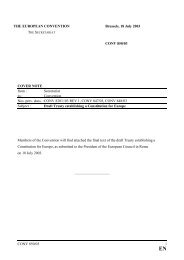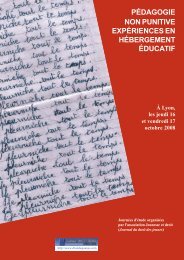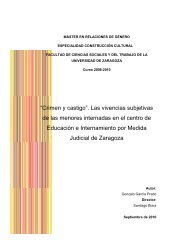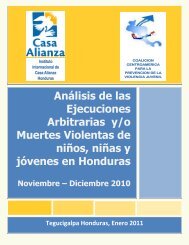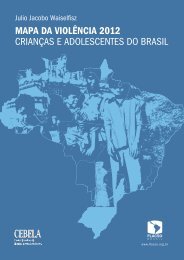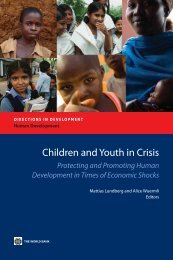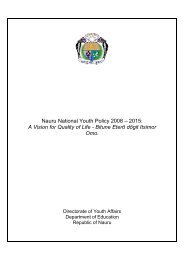Hosted by www.ijjo.org
Hosted by www.ijjo.org
Hosted by www.ijjo.org
You also want an ePaper? Increase the reach of your titles
YUMPU automatically turns print PDFs into web optimized ePapers that Google loves.
Chapter 12 | Appeals: Right to Appeal and Representation<br />
an adjudicator as his or her determination would have<br />
no precedent value).<br />
67 R (on the Application of B) v. the London Borough of<br />
Merton [2003] EWHC 1689.<br />
54 In this case no question were raised about the possibility<br />
of her being a victim of child trafficking.<br />
55 As asylum seekers were not permitted to work at that<br />
time, it is unlikely that she was refused Controlled<br />
Legal Representation on her means. There is also substantial<br />
objective evidence which indicates that former<br />
child soldiers may be persecuted on return on account<br />
of the atrocities they may have taken part in.<br />
56 It was not possible to ascertain the grounds upon<br />
which he had appealed from the determination of<br />
his appeal.<br />
57 Information provided <strong>by</strong> Simone Hugo and Nerissa<br />
Steel, 2005.<br />
58 Statistics provided <strong>by</strong> the Legal Services Commission.<br />
59 Although asylum appeals take place in a tribunal setting,<br />
the proceedings are adversarial and deal with complex<br />
issues of law and fact and even adult asylum seekers<br />
rarely succeed without proper legal representation.<br />
60 See Immigration Contract documents issued <strong>by</strong> the<br />
Legal Services Commission.<br />
61 Firms of solicitors or not for profit <strong>org</strong>anizations who<br />
were contracted to supply representation at asylum<br />
appeals.<br />
62 From 2004, solicitors and case workers wishing to<br />
practice in immigration and asylum law have been<br />
required to obtain accreditation under a scheme set<br />
up <strong>by</strong> the Law Society and the Legal Services Commission.<br />
63 Solicitors who practice in Family Law and who have<br />
been admitted to the Children’s Panel receive a 15%<br />
uplift on their fees when representing a child.<br />
64 Coker, Jane, Finch, Nadine, and Stanley, Alison. Legal<br />
Action Group publication. 2002.<br />
65 ILPA, November 2004, funded <strong>by</strong> the Nuffield Foundation.<br />
Heaven Crawley with Gaenor Bruce, Jane Coker,<br />
Nadine Finch, Susan Rowlands, Sue Shutter and Alison<br />
Stanley.<br />
66 Committee on the Rights of the Child: Concluding<br />
Observations: United Kingdom of Great Britain and<br />
Northern Ireland 09/10/2002.<br />
68 Immigration Appellate Authority. Adjudicator Guidance<br />
Note No. 8. Unaccompanied Children, April 2004,<br />
para 3.4.<br />
69 Information provided <strong>by</strong> a Senior Immigration Judge.<br />
70 The Asylum and Immigration Tribunal, which took<br />
over responsibility for appeals on 4 April 2005, has<br />
stated that it expects any separated child to be accompanied<br />
to an appeal hearing <strong>by</strong> his or her social worker<br />
and that it will adjourn hearings where they do not<br />
appear with the child. It is too early to ascertain whether<br />
this is being applied in practice or what happens if the<br />
separated child has no allocated social worker.<br />
71 The Hearing Centre at Wood Green in London.<br />
72 Ibid, Endnote 68. This Guidance is now issued to all<br />
Immigration Judges sitting in the new Asylum and<br />
Immigration Tribunal, as is ILPA’s Working with children<br />
and young people subject to immigration control:<br />
Guidelines for best practice (November 2004).<br />
73 This case related to age assessments carried out <strong>by</strong><br />
local authorities but its general principles can also<br />
be applied at the appellate stage. Mr. Justice Stanley<br />
Burnton held that: (1) a decision maker must not simply<br />
accept the Home Office’s view of a child’s age; (2)<br />
a decision maker must not just rely on the child’s<br />
physical appearance; (3) a decision maker must elicit<br />
the general background of the separated child, including<br />
family circumstances and history, educational<br />
achievements and activities pursued in the past few<br />
years. Ethnic and cultural information may also be<br />
useful; (4) if there was a reason to doubt the child’s<br />
own statement, the decision maker will have to make<br />
an assessment of his or her credibility <strong>by</strong> asking<br />
questions designed to test his or her credibility; and<br />
(5) the burden of proof lay with the separated child.<br />
<strong>Hosted</strong> <strong>by</strong> <strong>www</strong>.<strong>ijjo</strong>.<strong>org</strong><br />
161


